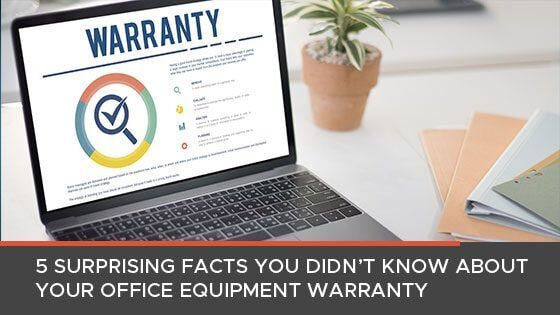5 Surprising Facts You Didn’t Know About Your Office Equipment Warranty
January 7th, 2025 | 3 min read
By CJ Porteous

For office managers and administrators, a comprehensive warranty can prevent significant costs and headaches. On the other hand, a lousy warranty is barely worth the paper it’s printed on and can end up drastically inflating total cost of ownership.
Although conscientious office managers rely on service contracts for preventative maintenance, many will miss cost-saving opportunities presented by their existing product warranty. Spotting these opportunities, however, requires a close reading of warranty terms that many office managers don’t have the time for.
There are many reasons why this is the case. One crucial fact is that every office equipment warranty is different, and most manufacturers issue different warranties for different products. Even in a small office, keeping track of them all can be a time-consuming challenge that draws on office resources.
However, navigating the world of office equipment warranty terms doesn’t have to be so confusing. There are terms and conditions common to many warranties that you may not be aware of. Use this guide to look for the most important terms to your warranty agreement.
5 Things You Might Not Know About Your Office Equipment Warranty
While every manufacturer has the right to guarantee its products according to its own rules, there are patterns that office managers can use to make the most of their product warranties. Consider the following facts about office equipment warranties for guidance:
1. Implied Warranties Can Be Legally Binding
Unless you are buying a second-hand item “as-is,” there are certain implied warranties covered under various provincial and territorial laws. These laws vary from place to place, but you can find more comprehensive coverage in the Canadian Consumer Handbook.
While it is generally understood that companies selling “as-is” items are disclaiming any responsibility for the item’s condition or functionality, getting out of implied warranties may not be so easy for them. For instance, in some jurisdictions, a manufacturer has to expressly tell customers exactly what’s wrong with an item to disclaim liability for it legally. This can also apply for factory seconds and b-stock equipment.
2. Look Beyond the Warranty Booklet
When a manufacturer guarantees a product for a certain number of uses or a certain amount of time, it’s making an express warranty. There is nothing special about a warranty booklet when it comes to making express warranties – which means that advertisements, posters, and even promotional packaging that claim in writing can also constitute an express warranty.
Keep any written performance guarantees on-hand and familiarize yourself with them. If an office equipment provider writes down or emails a performance claim, those also count as an express warranty.
3. You Can Read the Written Warranty Before You Buy
Optional extended warranties can often be the vehicles of the shadier tricks electronics providers will try. Sometimes, retailers will try to sell extended warranties that overlap with existing manufacturer warranties. Technically, this is legal. But, it is illegal for a retailer not to allow customers to read the written warranty prior to purchase.
4. Secondary Warranty Channels May Exist
If you purchase an item using a credit card, you may be able to satisfy warranty complaints through the terms of your payment agreement. In some jurisdictions, credit card chargebacks offer consumers extra ammunition for presenting issues to manufacturers. In other cases, credit card issuers will actually extend certain manufacturer warranties of their own accord.
Although many retailers, manufacturers, and service providers prominently display their warranty terms and conditions on their websites, these documents are often written in complicated legalese. Secondary warranty channels, such as through your payment provider, may give you the ability to sidestep the laborious task of parsing these challenging documents.
5. Unreasonable Warranties Are Illegal
If a warranty’s terms and conditions make it difficult or impossible for consumers to receive the warranty’s benefits, the warranty provider may be committing a crime. One example of this kind of behaviour is when a retailer charges shipping and restocking fees that are worth more than the item itself.
However, manufacturers, retailers, and service providers do have the right to protect themselves against potential warranty fraud. To make your case, you will have to demonstrate that your warranty claim is legitimate before you can compel the company to uphold its warranty.
Reputable Partners Offer Comprehensive Warranties
One of the easiest ways to make sure your office equipment warranty is comprehensive and reliable is by working with a reputable provider. This office technology provider will either take the time before you purchase to help you understand exactly where your warranty rights begin and end or offer you a blanket warranty that applies to all of the items it sells, replacing the multitude of complicated manufacturer warranties.
Do you have more questions about your MFP or MFD warranty? We are here to help you understand your rights, send us a note with your question!
Cory Porteous
Marketing Manager
Office Interiors
Subscribe to Our Blog
Contact Us
If you’re ready to start improving productivity, streamlining processes, and love the way you work through optimized workspaces and office technology, contact us today. Our team of experts is here to help!
Topics:


